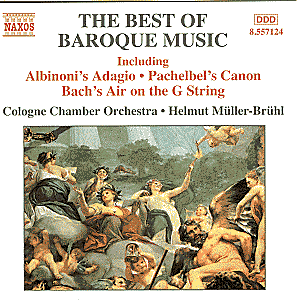Yes, this is another Naxos compilation CD. Yes,
it includes pieces already available, but it also includes some
good and thoughtful performances of pieces which have been especially
recorded for it. This is an unusual state of affairs but one which
is most advisable when a disc needs to be filled with quality
performances and consistently good quality music. The back of
the CD proclaims that the disc brings together "the greatest
music from the baroque era" and "a veritable feast of
Baroque music". And yet, incidentally, there is no ‘Four
Seasons’.
As you can see the selection is fairly predictable
with the possible exception of the attractive Recorder Concerto
movements by Telemann and one from a Vivaldi Flute Concerto. In
fact the three well chosen pieces by Telemann made me realize
again what an original he was and how much we tend to underestimate
him overshadowed by the great J.S.B.
It was the Cologne Chamber Orchestra that so
impressed me earlier this year with a recording of Haydn symphonies
conducted by Müller-Bruhl (Naxos 8.557124). I described them
then as ‘historically aware’ performances, using modern instruments
but with stylistic discipline. The harpsichord, for example, is
audible but not obtrusive. There is either no or very little use
of vibrato. The phrasing uses a variety of string bowing techniques
which is in keeping with contemporary practice.
For listeners coming to this repertoire for the
first time the booklet notes by Keith Anderson are clear with
the composer’s contribution to each genre put into geographical
and musical context. Brief biographies are given. Incidentally
the notes are not presented in the order in which the music is
presented on the CD.
If you are a long-standing collector then this
CD is probably not for you unless you are looking for car background
listening. Nothing here will jolt you too much and there is enough
strong, fast and loud music to keep you awake as you plod up the
M4 on a wet Friday in September.
None of the performances are what we might call
‘naff’. There are no weak moments … indeed there are many to savour.
Special mention should be made of the brass playing which is crisp
and neat in the Bach orchestral suites. There is a particularly
scintillating performance of the final Allegro in Bach’s Brandenburg
No.4. The ‘Arrival of the Queen of Sheba’, a good choice to open
the CD, is ideally paced and balanced. Some listeners may object
to the rather fast tempo adopted for the de-sentimentalized Adagio
from the famous Albinoni/Giazotto amalgamation with its rather
curious staccato opening chords. However, on the whole, this is
an attractive disc which will afford new listeners to classical
music much pleasure and interest.
Gary Higginson
See also review
by Don Satz

